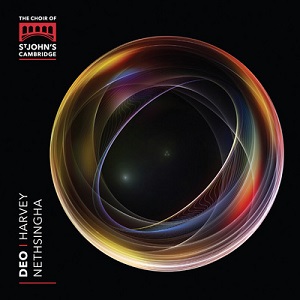The output of late British composer Jonathan Harvey is uncommonly broad. Take the famous Mortuos Plango, Vivos Voco, for example, which was realized at IRCAM in 1980 and shows the composer at the forefront of electro-acoustic experimentation in Europe. Then consider that a series of works simultaneously roots him in the British choral tradition. The Choir of St. John’s College, Cambridge has recorded a collection of these sacred pieces that is surely the finest release on its own Signum label to date. (As a former member of the choir, I featured in the arguably less fruitful Chandos series.) Harvey, an uncertain Christian turned explorer of East Asian philosophies, regarded the spiritual as intrinsic to all human life, and here is a disc to convince you of his music’s universal power.
No choir performs these works better than St. John’s, which sings with the intensity, commitment, and, under music director Andrew Nethsingha, attention to detail that Harvey requires. The performers and composer are strongly linked–Harvey was an undergraduate at the college, and previously a chorister at St. Michael’s College, Tenbury where Nethsingha’s father was organist–and Nethsingha’s extensive sleeve notes reveal a deep reverence for their subject. Evidently, this has been transmitted to the choir: it sculpts its text sumptuously in I Love The Lord, achieving a devotional élan when febrile pianissimos alternate with surges of adulation. The Magnificat and Nunc dimittis crackle with detail (there is whispering, pitched speech and shouting) and Come Holy Ghost scales transcendental heights, its canonic melodies wafting like clouds of incense even before the choir fans into chapel to deliver its melodic fragments in free time (the washy effect achieved on disc is striking) as a powerful treble line soars over the hubbub.
The organ, which accompanies the choir on a number of tracks, makes two solo appearances, and while Laus Deo is not Harvey’s most distinctive piece, Toccata for Organ and Tape, which pitches organ scholar Edward Picton-Turbervill against a pre-recorded beat, is an engaging example of his electro-acoustic music. But the unaccompanied works are the real meat on this disc. The Royal Banners Forward Go, with its brisk tempo and bright bursts of light, generates greater drama than David Hill’s earlier recording with this choir. Annunciation, written by Harvey for St. John’s at the end of his life, closes the disc with a sense of deliverance, the choir providing an intense warmth and tenderness that is its trademark.
































